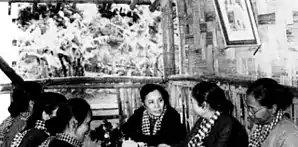Nguyễn Thị Bình
Nguyễn Thị Bình (born Nguyễn Châu Sa; 26 May 1928) is a Vietnamese communist leader and politician who negotiated at the Paris Peace Conference on behalf of the Viet Cong, or National Front for the Liberation of South Vietnam.
Nguyễn Thị Bình | |
|---|---|
 | |
| Vice President of Vietnam | |
| In office September 10, 1992 – August 8, 2002 | |
| Preceded by | Nguyễn Thị Định |
| Succeeded by | Trương Mỹ Hoa |
| Ministry of Education and Training | |
| In office July 3, 1976 – February 15, 1987 | |
| Preceded by | Nguyễn Văn Huyên |
| Succeeded by | Phạm Minh Hạc |
| Minister of Foreign Affairs of the Provisional Revolutionary Government of the Republic of South Vietnam | |
| In office June 8, 1969 – July 2, 1976 | |
| Preceded by | Office Created |
| Succeeded by | Office Abolished |
| Personal details | |
| Born | Nguyễn Thị Châu Sa 26 May 1928 Châu Thành, Sa Đéc Province, French Indochina |
Life and work
Nguyễn Thị Bình was born in 1928 in Châu Thành, Sa Đéc Province and is a granddaughter of the Nationalist leader Phan Chu Trinh.[1] She studied French at Lycée Sisowath in Cambodia and worked as a teacher during the French colonisation of Vietnam. She joined Vietnam's Communist Party in 1948. From 1945 to 1951, she took part in various intellectual movements against the French colonists. Subsequently, she was arrested and jailed between 1951 and 1953 in Chí Hòa Prison (Saigon) by the French colonial authority in Vietnam.[2]

During the Vietnam War, she became a member of the Vietcong's Central Committee and a vice-chairperson of the South Vietnamese Women's Liberation Association. In 1969 she was appointed foreign minister of the Provisional Revolutionary Government of the Republic of South Vietnam. A fluent French speaker, Bình played a major role in the Paris Peace Accords on Vietnam, an agreement that was supposed to end the war and restore peace in Vietnam, which was signed in Paris and which entered into force 17 January 1973.[3] She was expected to be replaced by a male Vietcong representative after preliminary talks, but quickly became one of the group's most visible international public figures.[4] During that time, she was very famous in representing Vietnamese women with her elegant and gracious style, and was named by the media as "Madame Binh". She was one of those who signed the Paris Peace Accords.[5]
After the Vietnam War, she was appointed Minister of Education of the Socialist Republic of Vietnam[3] and from 1982 to 1986, which she was the first female minister ever in the history of Viet Nam. Nguyen Thi Binh was a member of the Central Committee of Vietnam's Communist Party, since 1987 to 1992, was Vice Head of the Central External Relations Department of Party. The National Assembly elected her twice to the position of Vice President of the Socialist Republic of Vietnam for the terms 1992–1997 and 1997–2002.[6]
References
- "Nguyen Thi Binh". Northeastern Dictionary of Women's Biography (3rd ed.). Boston: Northeastern University Press. 1999. pp. 400–401. ISBN 978-1-55553-421-9.
- Brigham, Robert K. (2011). "Nguyen Thi Binh". The Encyclopedia of the Vietnam War: A Political, Social, and Military History (2nd ed.). Santa Barbara: ABC-CLIO. pp. 834–835. ISBN 978-1-85109-961-0.
- Hy V. Luong (2003), Postwar Vietnam: dynamics of a transforming society, Rowman & Littlefield, ISBN 0847698653, p. 223
- "Voice of the Vietcong in Paris". The New York Times. 18 September 1970. ISSN 0362-4331. Retrieved 23 January 2021.
- "BBCVietnamese.com | Việt Nam | BBC phỏng vấn bà Nguyễn Thị Bình". www.bbc.com (in Vietnamese). Retrieved 17 June 2018.
- "BBCVietnamese.com | Việt Nam | BBC phỏng vấn bà Nguyễn Thị Bình". www.bbc.com (in Vietnamese). Retrieved 17 June 2018.
| Political offices | ||
|---|---|---|
| Preceded by Nguyễn Hữu Thọ |
Vice President of Vietnam 1992–2002 |
Succeeded by Trương Mỹ Hoa |